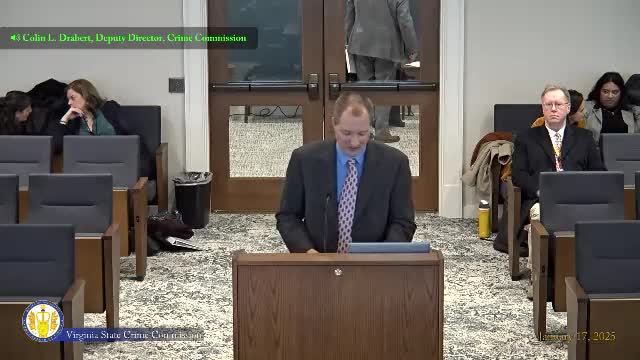Crime commission recommends ALPR limits, including 30-day retention and highway permitting by state police
Get AI-powered insights, summaries, and transcripts
Subscribe
Summary
The commission recommended legislation to regulate automatic license-plate readers, imposing a 30-day data retention period, limits on permitted uses, vendor approval, public posting requirements and a delayed vendor-approval timeline for state highways.
The Virginia Crime Commission voted to recommend legislation to regulate automatic license-plate readers (ALPRs), endorsing a framework that limits use, sets a 30-day retention period and establishes vendor and permitting controls.
Staff described the bill as a regulatory package that would allow law enforcement to use ALPRs for defined public-safety purposes — active criminal investigations, missing or endangered-person cases, investigations related to human trafficking and to receive alerts for wanted persons, stolen vehicles and life-safety license-plate matches — while restricting noncriminal uses and commercial sale of data. The draft requires agencies to adopt and publicly post ALPR policies, produce annual usage reports and maintain an audit trail showing who accessed ALPR searches and why.
Among the measures approved were: a 30-day automatic retention limit (with explicit ability to retain records as part of an active criminal investigation), a prohibition on the sale of plate data and limits on sharing, a requirement that agencies verify alerts before making traffic stops, and a vendor-approval process. The bill gives the Virginia State Police sole authority to obtain permits to install ALPR devices on state highways, bridges, tunnels or special structures. Most of the statute would take effect July 1, 2025; the subsection governing the statewide vendor list and related procurement execution was delayed to July 1, 2026, to allow the Division of Purchases and Supply to identify authorized systems.
Public commenters raised privacy and transparency concerns. Chris Kiser, policy director at ACLU of Virginia, acknowledged that 'the group has been critical of ALPRs on privacy and civil liberties grounds' and warned that widespread deployment could change the constitutional analysis around surveillance. Legal Aid Justice Center warned that broad 'investigation' language could be overbroad, urged making vendor contracts subject to the Virginia Freedom of Information Act, and asked how the state will prevent cross-jurisdictional federal access to Virginian's data. The Virginia Association Chiefs of Police said ALPRs are a longstanding investigative tool and urged technical clarifications to make the bill operational; the chiefs expressed willingness to work with staff on technical amendments and supported a delayed enactment to resolve those issues.
Commissioners asked staff about the basis for the 30-day retention period; staff said the number reflected a policy compromise based on discussions with law enforcement and comparisons with other states. Staff also said data can be retained beyond 30 days when downloaded as part of an active investigation.
The commission voted to recommend the ALPR legislation by voice vote and then recorded a roll-call result: the measure passed 10-3.
The commission asked staff to continue working with law enforcement and civil-rights organizations to refine operational definitions (for example, what constitutes an 'act of criminal investigation') and contract and reporting language before the bill advances to committee.
